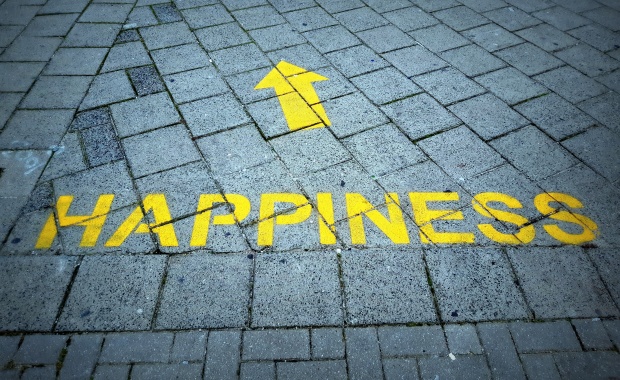Life
The Top 10 Ways That You Can Buy Happiness

Money should make you happy. At least, it should if you’re spending it right.
That’s the argument put forth by University of B.C. psychology professor Elizabeth Dunn. In a paper co-authored by two world-renowned experts on happiness, Daniel Gilbert of Harvard University and Timothy Wilson of the University of Virginia, Dunn argues that most people are terrible at predicting what will make them happy, leading them to routinely spend money on all the wrong things.
“Money is an opportunity for happiness, but it is an opportunity that people routinely squander because the things they think will make them happy often don’t,” writes Dunn and her colleagues.
For decades, researchers have known that money buys happiness, but only up to a point.
Research shows that wealthy people are not significantly happier than those with moderate incomes — and according to conventional wisdom, that’s because many of the things that make us happy aren’t for sale.
Dunn and her co-authors of the paper, “If Money Doesn’t Make You Happy, Then You Probably Aren’t Spending It Right” — to be published in the upcoming Journal of Consumer Psychology — adamantly disagree with that assertion.
They boldly suggest that if you spend wisely, “money can buy many, if not most, if not all of the things that make people happy.”
Drawing on their research, The Province presents 10 ways to better spend your money.
1. Buy many small lovely things rather than one big one
 Go ahead, buy yourself that $4 latte.
Go ahead, buy yourself that $4 latte.
Ever had an economist tell you how easily a $4 latte at work every morning will quickly add up to a staggering yearly sum of $1,040? And wouldn’t you rather spend that kind of money on something bigger, like a vacation or home theatre system? Well, the answer may be no.
It may well be that a latte a day, or every few days, will make you happier than a single big-ticket item once a year.
“This is not to say that there’s anything wrong with large purchases,” writes Dunn. “But as long as money is limited by its failure to grow on trees, we may be better off devoting our finite financial resources to purchasing frequent doses of lovely things rather than infrequent doses of lovelier things.”
One reason why small, frequent pleasures beats one large infrequent one is because we’re creatures of adaptation.
“If we buy an expensive dining room table… it’s pretty much the same table today as it was last week. Because frequent small pleasures are different each time they occur, they forestall adaptation,” says Dunn.
Research also tells us that breaking up a pleasurable experience into a series of experiences can help maximize joy, something frequent coffee drinker Eva Sajoo, of Vancouver, seems to understand innately.
“Certainly I get a lot of pleasure out of a very well-crafted cup of coffee,” she says. “But I think you enjoy it more if you don’t have it every day.”
2. Savor the cheap joys of life
Cozy up to a movie on a rainy day. Or go out for a walk on a bright summer’s day.
Not only are these simple pleasures often cheap, or better yet, free, but savouring the mundane joys of life will make you happier, according to research.
“In a study of Belgian adults, individuals who had a strong capacity to savour the mundane joys of daily life were happier than those who did not,” writes Dunn.
Interestingly, the same study found this capacity to savour “mundane joys” was significantly reduced among wealthy individuals. That may be because the wealthy have unfettered access to “peak experiences,” which undermines their ability to appreciate smaller moments.
3. Practice ‘presence’ for an extra jolt of joy
Spending money on yoga retreats, meditation DVDs or self-help books isn’t just for hippies or the spiritually inclined.
Scientific research is now also extolling the benefits of becoming more “present” or “engaged” — which activities such as yoga are said to help you achieve.
Researchers have found that people who are more fully engaged in an experience will get more enjoyment from it.
“A wandering mind is an unhappy mind,” Dunn and colleagues sum up succinctly.
Vancouver yoga teacher Jacci Collins says she’s experienced firsthand the positive effects of presence.
“I use not only my physical practice of yoga, but my meditation practice as a way of just trying to bring me back into my life, because sometimes, life just spins out of control and the days are going by so quickly. And when you’re aware of what you’re doing at every moment, somehow you have more appreciation for every moment,” says Collins.
4. Buy experiences, not things
Follow in the footsteps of 19,000 screaming teens who spent $60 on a Justin Bieber concert last week, rather than squandering it at the mall. That’s right, these 19,000 “Bielebers” were made happier simply by spending their money on an experience rather than a thing.
If happiness can be bought, then it’s essential to get the buying right, according to Dunn and colleagues.
“Experiences are good, but why are they better than things? One reason is that we adapt to things so quickly. After devoting days to selecting the perfect hardwood floor to install in a new condo, homebuyers find their once beloved Brazilian cherry floors quickly become nothing more than the unnoticed ground beneath their feet,” writes Dunn. “In contrast, their memory of seeing a baby cheetah at dawn on an African safari continues to provide delight.”
Mark Holder, associate professor of psychology at the University of B.C. Okanagan and a happiness expert, adds that the difference in happiness gained from a material object versus an experience is most acute after two weeks.
“When we spend, we don’t tend to savour our big screen TVs, but we do tend to savour our experiences with others. We relive them through photographs, for example, we relive them by telling stories and by reliving, those people are happier,” says Holder.
5. Spend on others, not yourself
Next time you think of buying something for yourself, buy it for a friend instead. Spending on others will make you happier, not only because it makes you look good (thereby boosting your mood), but because spending on others is a legitimate way to improve our connections with others, according to Dunn.
While this advice may seem to make sense, especially in light of how often we’re reminded that “giving is receiving,” it’s surprising how many people disbelieve it, says Lara Aknin, a graduate student working with Dunn.
A 2008 survey of more than 100 UBC students conducted by Aknin found that a significant majority of students believed money spent on themselves would make them happier than if it were spent on others.
“There’s this disconnect between what people believe will make them happy and what actually does,” says Aknin. “People aren’t that good at making good predictions because their look-ahead is plagued by all these errors, and we forget that when we look into the future we’re not going to be in the exact same state that we are now.”
6. Buy less insurance
Next time you’re asked if you want to buy a warranty, say no. Businesses have long capitalized on our tendency to underestimate how well we cope with traumas, tragedies or just plain old bad luck. By offering an insurance against “unhappiness” from extended warranties to insurance policies, we’re actually spending more than we need to guard against negative situations.
Dunn explains that just as we have a physical immune system to ward off disease, our psychological immune system has a remarkable ability to reconstruct and rationalize a negative situation into a positive one: “Ordinary people are remarkably adept at re-construing events in order to avoid self-blame and the regret that accompanies it.”
7. Delay, delay, delay consumption
Don’t be tempted by those optimistic sales campaigns that proclaim “No money down!” or “Don’t pay for six months.”
If you wait till you have the cash to purchase the product or service, you’ll get an extra jolt of happiness, says Dunn.
There are a couple of reasons for this. One is that the “consume now, pay later” mentality leads people to short-sighted behaviour, such as racking up debts or saving little for retirement — decisions that can ruin lives, argues Dunn.
But another, less obvious reason why delayed consumption leads to more happiness is because “anticipation is a source of ‘free’ happiness.”
“Research shows people can reap substantial enjoyment from anticipation of an upcoming event even if the event itself is not entirely enjoyable,” according to Dunn.
8. Happiness is in the details
Who hasn’t dreamt of owning a vacation home — say, a waterfront cabin or ski chalet? Well, those dream homes may be more of a mirage in a desert.
Humans are adept at imagining, but tend to skip over the details, seeing the future in “simple, high-level ways,” argues Dunn.
That means while we’re picturing the glassy waters of a lakeside retreat, finer details like calls about a plumbing disaster, or long drives home after the vacation, or the constant buzz of mosquitoes while you’re enjoying your glass of wine tend to recede in the background.
“Consumers who expect a single purchases to have a lasting impact on their happiness might make more realistic predictions if they simply thought about a typical day in their life,” Dunn advises.
9. Don’t shop around
Save your time and refrain from comparison shopping. Recent research suggests that comparison shopping may distract consumers from the attributes that will make them happiest, by making them focusing on the differences between available options.
Dunn gives the familiar example of shopping for real estate, in which would-be buyers typically attend countless open houses and viewings and scrutinize spec sheets for features and information on each home.
“As a result, home buyers might overestimate the hedonic consequences of living in a big, beautiful house in a great location vs. a more modest home, leading them to take out a larger loan than they can truly afford, ” argues Dunn.
The same process may also lead consumers to seek out products that provide the “best deal,” which is not always the product that makes them happiest.
10. Follow the herd
Can’t decide which book to read? Movie to watch? Next vacation? The easiest way to get promising “happiness” results is to follow the herd.
“Research suggests that the best way to predict how much we will enjoy an experience is to see how much someone else enjoyed it,” explains Dunn.
So chances are, summer blockbusters are as likely to bring us as much joy as they did the thousands of other people who’ve seen them.
A 2009 study drives home the point: Women were asked to predict how much they would enjoy a speed date with a particular man. Some women were shown his photo and autobiography. A second group were shown only the rating of how much other women enjoyed the date.
Think the vast majority of women shown the photo and autobiography would make a more accurate prediction? The opposite proved true.
By Lena Sin/ Source: The Province
Did You Know
How Skilled Migrants Are Building Successful Careers After Moving Countries
Behind every successful skilled migrant career is a mix of resilience, strategy, and navigating systems built for locals.

Moving to a new country for work is exciting, but it can also be unnerving. Skilled migrants leave behind familiar systems, networks, and support to pursue better job opportunities and a better future for their families. (more…)
Life
10 Research-Backed Steps to Create Real Change This New Year
This New Year could finally be the one where you break old patterns and create real, lasting change.

Every New Year, we make plans and set goals, but often repeat old patterns. (more…)
Life
9 Harsh Truths Every Young Man Must Face to Succeed in the Modern World
Before chasing success, every young man needs to face these 9 brutal realities shaping masculinity in the modern world.

Many young men today quietly battle depression, loneliness, and a sense of confusion about who they’re meant to be.
Some blame the lack of deep friendships or romantic relationships. Others feel lost in a digital world that often labels traditional masculinity as “toxic.”
But the truth is this: becoming a man in the modern age takes more than just surviving. It takes resilience, direction, and a willingness to grow even when no one’s watching.
Success doesn’t arrive by accident or luck. It’s built on discipline, sacrifice, and consistency.
Here are 9 harsh truths every young man should know if he wants to thrive, not just survive, in the digital age.
1. Never Use Your Illness as an Excuse
As Dr. Jordan B. Peterson often says, successful people don’t complain; they act.
Your illness, hardship, or struggle shouldn’t define your limits; it should define your motivation. Rest when you must, but always get back up and keep building your dreams. Motivation doesn’t appear magically. It comes after you take action.
Here are five key lessons I’ve learned from Dr. Peterson:
-
Learn to write clearly; clarity of thought makes you dangerous.
-
Read quality literature in your free time.
-
Nurture a strong relationship with your family.
-
Share your ideas publicly; your voice matters.
-
Become a “monster”, powerful, but disciplined enough to control it.
The best leaders and thinkers are grounded. They welcome criticism, adapt quickly, and keep moving forward no matter what.
2. You Can’t Please Everyone And That’s Okay
You don’t need a crowd of people to feel fulfilled. You need a few friends who genuinely accept you for who you are.
If your circle doesn’t bring out your best, it’s okay to walk away. Solitude can be a powerful teacher. It gives you space to understand what you truly want from life. Remember, successful men aren’t people-pleasers; they’re purpose-driven.
3. You Can Control the Process, Not the Outcome
Especially in creative work, writing, business, or content creation, you control effort, not results.
You might publish two articles a day, but you can’t dictate which one will go viral. Focus on mastery, not metrics. Many great writers toiled for years in obscurity before anyone noticed them. Rejection, criticism, and indifference are all part of the path.
The best creators focus on storytelling, not applause.
4. Rejection Is Never Personal
Rejection doesn’t mean you’re unworthy. It simply means your offer, idea, or timing didn’t align.
Every successful person has faced rejection repeatedly. What separates them is persistence and perspective. They see rejection as feedback, not failure. The faster you learn that truth, the faster you’ll grow.
5. Women Value Comfort and Security
Understanding women requires maturity and empathy.
Through books, lectures, and personal growth, I’ve learned that most women desire a man who is grounded, intelligent, confident, emotionally stable, and consistent. Some want humor, others intellect, but nearly all want to feel safe and supported.
Instead of chasing attention, work on self-improvement. Build competence and confidence, and the rest will follow naturally.
6. There’s No Such Thing as Failure, Only Lessons
A powerful lesson from Neuro-Linguistic Programming: failure only exists when you stop trying.
Every mistake brings data. Every setback builds wisdom. The most successful men aren’t fearless. They’ve simply learned to act despite fear.
Be proud of your scars. They’re proof you were brave enough to try.
7. Public Speaking Is an Art Form
Public speaking is one of the most valuable and underrated skills a man can master.
It’s not about perfection; it’s about connection. The best speakers tell stories, inspire confidence, and make people feel seen. They research deeply, speak honestly, and practice relentlessly.
If you can speak well, you can lead, sell, teach, and inspire. Start small, practice at work, in class, or even in front of a mirror, and watch your confidence skyrocket.
8. Teaching Is Leadership in Disguise
Great teachers are not just knowledgeable. They’re brave, compassionate, and disciplined.
Teaching forces you to articulate what you know, and in doing so, you master it at a deeper level. Whether you’re mentoring a peer, leading a team, or sharing insights online, teaching refines your purpose.
Lifelong learners become lifelong leaders.
9. Study Human Nature to Achieve Your Dreams
One of the toughest lessons to accept: most people are self-interested.
That’s not cynicism, it’s human nature. Understanding this helps you navigate relationships, business, and communication more effectively.
Everyone has a darker side, but successful people learn to channel theirs productively into discipline, creativity, and drive.
Psychology isn’t just theory; it’s a toolkit. Learn how people think, act, and decide, and you’ll know how to lead them, influence them, and even understand yourself better.
Final Thoughts
The digital age offers endless opportunities, but only to those who are willing to take responsibility, confront discomfort, and keep improving.
Becoming a man today means embracing the hard truths most avoid.
Because at the end of the day, success isn’t about luck. It’s about who you become when life tests you the most.
Change Your Mindset
The Four Types of Happiness: Which One Are You Living In?
Most people chase success only to find emptiness, this model reveals why true happiness lies somewhere else.

In a world driven by rapid technological growth and constant competition, many people unknowingly trade joy for achievement. (more…)
-

 Health & Fitness1 week ago
Health & Fitness1 week agoWhat Minimalism Actually Means for Your Wellness Choices
-

 Did You Know1 week ago
Did You Know1 week agoWhy Most Online Courses Fail and How to Fix Them
-

 Business1 week ago
Business1 week agoIf Your Business Internet Keeps Letting You Down, Read This
-

 News4 days ago
News4 days agoBrandon Willington Builds 7-Figure Business by Ignoring Almost Everything


























7 Comments